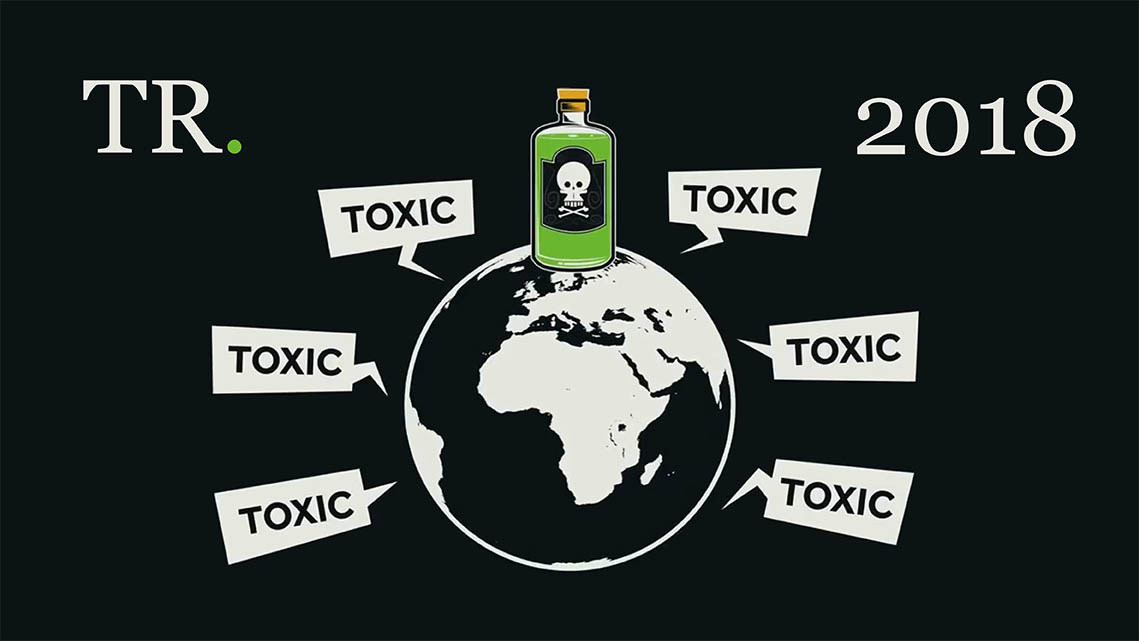
Per gli Oxford Dictionaries, “Toxic” è la parola dell’anno che si avvia a conclusione.
L’aggettivo tossico è definito come “velenoso” e apparve per la prima volta nella lingua inglese a metà del XVII secolo; deriva dal latino medievale toxicus, che significa “avvelenato” o “impregnato di veleno”.
Ma la storia mortale della parola non inizia da lì. Il termine latino medievale era stato a sua volta preso in prestito dal latino toxicum, che significa “veleno” e che ha le sue origini nel greco toxikon pharmakon – veleno letale usato dagli antichi greci per imbrattare le punte delle loro frecce. È interessante notare che non è pharmakon la parola che ha dato significato a veleno, ma toxikon, che deriva dalla parola greca che sta a significare ‘arco’, ovvero toxon.
Perché “toxic” è stata scelta come parola dell’anno 2018?
La parola dell’anno scelta dagli Oxford Dictionaries è una parola o espressione che viene giudicata idonea a rispecchiare l’ethos, l’umore o le preoccupazioni dell’anno appena passato e deve essere una parola che abbia un potenziale duraturo in termini di significato culturale.
Nel 2018, “toxic” ha aggiunto molte corde al suo arco avvelenato, diventando un descrittore inebriante per gli argomenti più discussi dell’anno.
I dati in possesso di Oxford Dictionaries mostrano che, oltre ad un aumento del 45% nel numero di volte in cui tale termine è stato consultato su oxforddictionaries.com, nell’ultimo anno la parola “toxic” è stata usata in una serie di contesti, sia per i suoi significati letterali che metaforici.
In seguito si riportano, in ordine di frequenza assoluta di utilizzo, le 10 parole maggiormente utilizzate unitamente alla parola “toxic” nel 2018. Le parole non sono volutamente tradotte dall’inglese, lingua originale della ricerca.
Top 10 ‘toxic’ collocates in 2018 (by absolute frequency)
-
- Chemical
- Masculinity
- Substance
- Gas
- Environment
- Relationship
- Culture
- Waste
- Algae
- Air
Sourced from the Oxford corpus
Alcuni avvenimenti importanti del 2018 hanno portato all’accostamento fra la parola “toxic” e le 10 parole precedentemente riportate. In seguito vi riporto un esempio di alcuni avvenimenti, tratto in lingua originale dagli Oxford Dictionaries. Non ho tradotto questo passaggio in quanto penso abbia maggior senso una lettura in lingua originale.
Beyond the more usual substance warnings, this year toxic chemical has had particular significance as the nerve agent poisoning of a former Russian intelligence officer and his daughter in Britain sent shockwaves around the globe. Ongoing international attention to the case, including rising concern over who has access to the world’s toxic chemical stockpiles, ensured that ‘chemical’ topped the list of words most frequently seen alongside toxic in 2018.
Similarly literal and deadly are toxic substance, toxic gas, and toxic waste, with the latter especially becoming a focal point as the US seeks to combat the spread of toxic waste in the wake of hurricanes and people speak out against businesses burning toxic waste, notably in India.
This burning of toxic waste, resulting in the release of toxic gases, has been identified as one of a number of causes of toxic air. Air pollution has rapidly become a prime public health concern, and global attention reached a high in October 2018 when the World Health Organization published its report into the quality of air breathed by children worldwide. The report described this pollution as toxic air, plainly and potently signifying its poisonous nature, and with the aid of international media coverage, served to consolidate the association of toxicity and poor air quality in our lexicon.
Such pollutants are not only dangerous to our health, but to the health of our environment, and one of the many environmental issues discussed this year has been the toxic algae disaster in Florida, US. Thanks to a central role in the state’s Senate mid-terms race, toxic algae garnered so much commentary that ‘algae’ featured as the ninth-most frequently seen toxic collocate for 2018.
The term toxic environment itself, however, has been more frequently used in reference to harmful workplace environments and the toll this takes on the workforce’s mental health. From overly demanding workloads to outright sexual harassment, many companies have been exposed as crucibles for such toxic culture this year, which has seen mass walkouts at Google, the fashion mogul Philip Green disgraced, and the Speaker of the House of Commons accused of misusing his official powers to cover up allegations of bullying in Westminster.
Toxic relationships are not exclusive to the workplace, however, and whether its partners, parents, or even politicians, this year has seen so much discussion of ‘poisonous’ relationships across our society that ‘relationship’ is the sixth most-seen toxic topic for 2018. One reoccurring element in such discussions has been toxic masculinity.
Our corpus data shows that, after ‘chemical’, ‘masculinity’ is the most-used word in conjunction with toxic this year. With the #MeToo movement putting a cross-industry spotlight on toxic masculinity, and watershed political events like the Brett Kavanaugh Senate judiciary committee hearing sparking international debate, the term toxic masculinity has well and truly taken root in the public consciousness and got people talking in 2018.
Per approfondire l’argomento:
- The New York Times: ‘Toxic’ Is Oxford’s Word of the Year. No, We’re Not Gaslighting You.
- English Oxford Living Dictionaries: Word of the Year 2018.
Pavia, 16 novembre 2018.

